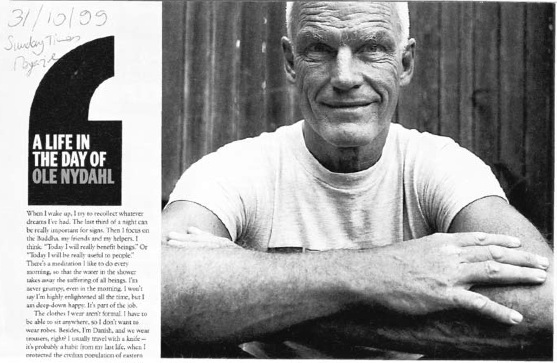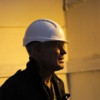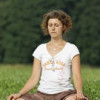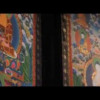Here’s a blast from the past! When Lama Ole was due to visit London on 15 November 1999 – ten years ago today – he was interviewed by telephone by Richard Johnson of the Sunday Times. The interview appeared in the “Life in the Day” section of the Sunday Times Magazine. We have reproduced it here for your enjoyment:
A LIFE IN THE DAY OF OLE NYDAHL
Interview by Richard Johnson, Sunday Times, 31 October 1999
When I wake up, I try to recollect whatever dreams I’ve had, ‘The last third of a night can be really important for signs. Then I focus on the Buddha, my friends and my helpers. I think: “Today I will really benefit beings.” Or “Today I will be really useful to people.” There’s a meditation I like to do every morning, so that the water in the shower takes away the suffering of all beings. I’m never grumpy, even in the morning. I won’t say I’m highly enlightened all the time, but I am deep-down happy. It’s part of the job.
The clothes I wear aren’t formal. I have to be able to sit anywhere, so I don’t want to wear robes. Besides, I’m Danish, and we wear trousers, right? I usually travel with a knife – it’s probably a habit from my last life, when I protected the civilian population of eastern Tibet. I’m a hands-on person – I would protect my friends if we got into trouble. I trained as a boxer. But I once got kidnapped by the FLN, one of the most violent groups in Colombia. We got held up with machine guns, and were very lucky to get out. I really felt the Buddha behind us that day.
Visiting all the Buddhist centres and lecturing, I travel twice around the world every year. I don’t have my own house. I have no possessions. I just have rooms in different centres – Copenhagen, San Francisco, Zurich. I’m happy to sleep on a floor. I don’t want to spend money on a hotel. I always think that the money I’m spending actually belongs to my friends.
I’m 57, and I would like to live a long time, because I think I’m useful. So I avoid things that are too fatty, too salty and too sugary. Besides, I like to stay in shape without having to run around the block. I was vegetarian, but my Buddhist teacher said: “you travel all the time, and if people have to make special food for you, it’s no good.” If something is already dead I will eat it, and make wishes for a good rebirth for the animal.
I believe in reincarnation. In 1986 my wife and I were visiting eastern Tibet. We went to a place where they’d never seen white people before. I recognized it. My wife, Hannah, recognized it too. When I was a child in Denmark, during the German occupation, I was always dreaming about mountains, and that I was protecting men in red skirts. I had never seen a monk before. I had never even seen a mountain. But the first time I got a pencil, I drew pictures of mountain warfare, especially how to take out snipers. I’m a frequent flyer. Sometimes I visit the airport shops. In India, whisky is very good for speeding up the bureaucracy – it sorts out any visa problems. We’re trying a homeopathic remedy for jet lag. Some friends say you just have to hold your ring finger. But then you can’t write, and I write all the time when I’m travelling….
…Travelling can be hard. I’ve been married for 30 years, and we’ve had to give up the idea of having children. You can’t put a child on the back seat and say: “Next stop is Frankfurt.” I communicate with my Buddhist teacher in Tibet by e-mail, and I’ll keep travelling unless he gives me gives me another order. I only have four days of holiday a year. Then I get on a motorcycle with some friends – all Buddhists – and we do 20 passes in the Alps at really high speeds. Or I go parachuting. The freefall comes very close to a level in meditation called “one taste”, where you’re aware without being aware. The last time I jumped out at 4km – all this free open space, but the clouds are much more fun. When we arrive at the next Buddhist centre, there’s always a meal waiting. Very often there’s press, so I get whisked off to talk to somebody. Ten minutes before the lecture I take it easy for a moment. Shifting from English to German to Danish to French isn’t so difficult. What’s difficult is shifting from written mode to spoken mode. The lecture will usually be an introduction to Buddhism, with something about absolute truth, karma, or death and rebirth. Then there’s a meditation and a blessing.
People come afterwards for a chat. One might bring a child for a blessing: one might ask for a divination — “Will I get this job? I use my beads, but I always check the results with common sense. Because I’m not a monk, there’s a lot of questions about love and sex. We recently had the Dalai Lama over. People were saying that they couldn’t use his teachings because they were all about abstinence. We say what the Dalai Lama gives are the teachings for monks, but there are also teachings for lay people. Tibet was a medieval society, but today we live in the modern world. By the time we’re back at the Buddhist centre, for a beer and a chat, it’s usually 2am. More than two or three beers is not good. The next day you’re not clear-headed.
I’m in bed by 4am – you need less sleep if you meditate. But I rarely let a night go without love. Speaking as a layman, being able to give love and not giving it is neurotic. Our bodies fit together so well. I think a life without love is wasted.
The lama Ole Nydahl, 57, was on his honeymoon in Nepal in 1968 when he was chosen to bring Buddha’s teachings to the West. Since 1972 he has launched 215 meditation centres around the world. Danish by birth, he has no permanent home. He will be lecturing at University College London on November 15
Other posts which may be of interest :
Tags: beer, Blessing, Colombia, Dalai Lama, Danish, Interviews, Karma, London, love, Meditation, rebirth, reincarnation, Richard Johnson, Sunday Times Magazine, The Times




 Follow
Follow